
OpEds
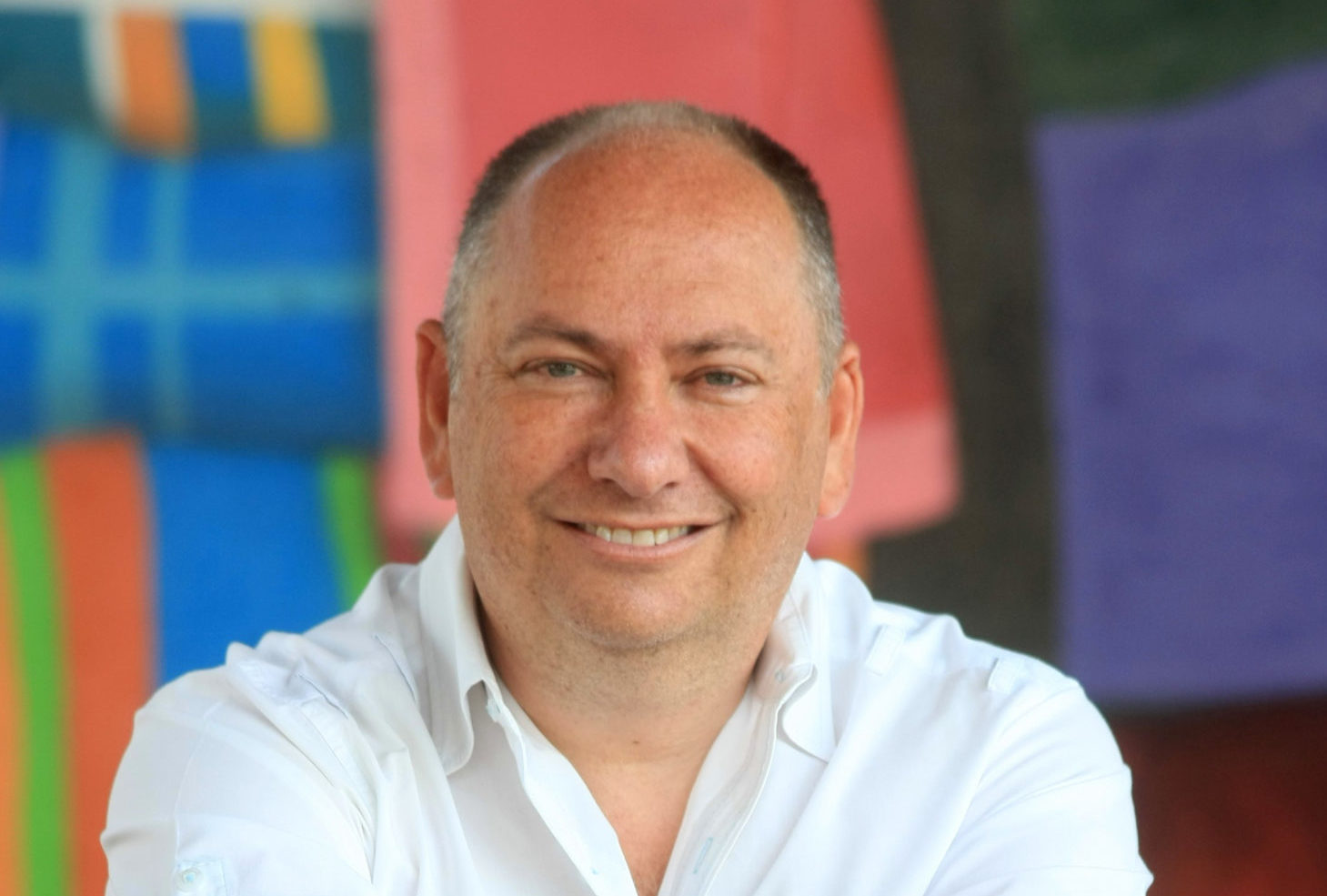
A battle for Israel’s very soul
It’s a balmy night in Tel Aviv. At 21:00, the temperature hovers above 30 degrees and the humidity clings to you like nylon. Hundreds of thousands of Israelis are marching with flags to Democracy Square, the renamed Kaplan Street of Tel Aviv. Along the way, at the base of the Fiverr building, the Israeli tech start-up “unicorn”, a loudspeaker broadcasts the voice of David Ben-Gurion, Israel’s founding father, reading Israel’s Declaration of Independence.
But times have changed, and today, Israel is at war with itself. Two hundred thousand people gather in Democracy Square and another 300 000 demonstrators in 149 other locations around the country for the thirtieth week of pro-democracy protests. Each week, the crowds get bigger and bigger.
The protests are loud, patriotic, frenetic, and jubilant. Almost everyone carries a flag, and when Hatikvah, the national anthem, is played, the crowd joins in proudly, boisterously, and defiantly. This is a battle for the very soul of Israel!
Bands perform, and the audience joins in singing “Ein li eretz acheret” (I have no other country). That evening, the podium is occupied by the former governor of the Bank of Israel, who repeatedly asks, “Why are we doing this?” The audience screams, “Busha! Busha!” (Disgrace! Disgrace!)
The protesters aren’t young. Many in the crowd appear to be in their 60s, 70s, and 80s. They are the founders of Israel, the heirs of its liberal democracy, fighting to preserve what they believe to be the only democracy in the Middle East. Some in the mosh pit of humanity are in wheelchairs, others look like they’ve just walked out of the gym, sinewy muscles and tight spandex – Israelis are a fit, good-looking lot.
The loudspeaker intones, “They will not divide us, we are here, left and right, Ashkenazi and Sephardi, religious and secular, this is our country. We are not going anywhere.” Yet, opinion polls show that 28% of Israelis are now actively looking to leave the country in the wake of Prime Minister Benjamin Netanyahu’s intention to neuter the Israeli Supreme Court.
Hundreds of drummers lead the crowd. On one occasion, a marching band struggled to parade through the throng of people. One protester carries a sign that says merely “1933”, a reference to the year Adolf Hitler assumed power, democratically, in pre-Nazi Germany. Its poignancy isn’t lost on the crowd.
Big trucks brought in by the police block access to the Ayalon Highway. Inevitably at some point in the evening, a handful of protesters will spill on to the freeway. Police will arrive on horseback, as will water cannons and machines that spray “skunk” spray, a noxious odour on demonstrators.
From the outside, it may be difficult to understand why hundreds of thousands of Israelis spend each Saturday evening protesting on the streets of Israel. Netanyahu and his far-right extremist government have taken the opportunity of their new majority in parliament to re-draw the judicial landscape in Israel. They do this without broad support or consensus. Polls indicate that 62% of Israelis oppose the judicial reforms, only 38% support it.
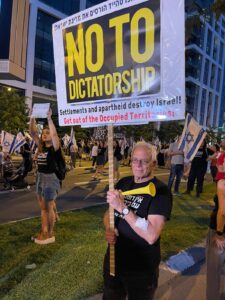
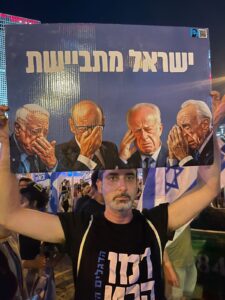


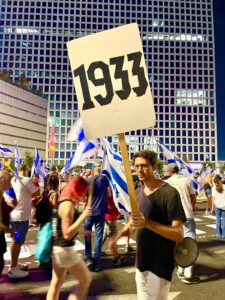
When you cut away the propaganda, the battle boils down to two legal philosophies.
Netanyahu’s governing coalition now believes its election majority empowers it to do as it will. No court has a right to oppose the democratically elected choice of the electorate, it claims. Protesters on the right often chant “64”, the triumphant number of seats Israel has cobbled together for the coalition. Key to retaining power is Netanyahu’s undertaking to appoint twice convicted fraudster and bribery recipient Aryeh Deri to the cabinet, a move blocked by Israel’s Supreme Court as unreasonable.
The Supreme Court has a far broader view of the rights of Israelis than many of the religious parties that make up part of Netanyahu’s extremist government. It’s a clash of civilisations, religious doctrine against secular liberalism.
In Western democracies, courts are empowered to protect the rights of citizens, often against the excesses of government. For this reason, power is split between the executive (president and/or prime minister and cabinet), legislature (parliament), and the judiciary (independent courts). These three centres of power counterbalance each other in a careful dance meant to reflect the will of the people and guarantee that transient radicalism or political expediency doesn’t derail society.
In more normal societies, citizens’ rights are guaranteed in a nation’s Constitution, a document that Israel has yet to draft. Israel’s courts have relied for the protection of individual rights on the principles enshrined in Israel’s Declaration of Independence and upon a set of semi-constitutional parliamentary acts know as, the “Basic Laws”. These basic laws allowed the Israeli Supreme Court to test government decisions for reasonableness and rationality.
But Netanyahu and his cabinet, some of whom were even denied the right to serve in the Israeli Defense Forces because of their radicalism, don’t wish to be encumbered by a court that can question the will of his coalition and majority.
For them, reshaping the political landscape would be easier if state institutions were hollowed out and the government unfettered in its actions. It’s the path to lesser democracy followed by Vladimir Putin in Russia, Recep Tayyip Erdoğan in Turkey, and Viktor Orbán in Hungary. It’s a path to a strong-man view of the world, an unfettered downward spiral away from democratic values.
So, why do I care? I’m not Israeli, I don’t hold an Israeli passport, and don’t live in the country. Why would I spend so much of my vacation attending protests?
As a Jew in the diaspora, Israel represents my values, aspirations, and ideals. It’s the ingathering of the exiles after 2 000 years of dispersion. It’s the national liberation movement of the Jewish people, that defeated British and Turkish colonialism and re-established the third Jewish state in the land of our people. It was a democracy in a sea of Arab dictatorship, it was a liberal country that protected women’s rights, minority rights, that respected all people. It took in not just Jewish immigrants but also Cambodia boat people and refugees fleeing Eritrea. It represented me and my beliefs.
Israel was a symbol of what we as a people could achieve in the aftermath of the Holocaust.
Much of my adult life has been spent supporting Israel and defending it against delegitimisation from a group of antisemites who have usurped the Palestinian cause to target the Jewish people rather than attempt to solve the Palestinian problem itself.
But when Israel no longer represents my values, when Israel is no longer a beacon of democracy, when Israel slides into racist, bigoted politics, unfettered and unrestrained by a Supreme Court, I can no longer stand silent. My holiday becomes a battle for the future of the Jewish people and the centrality of Israel to our lives.
I’m privileged to have joined hundreds of thousands on the streets of Tel Aviv, to keep alive the Zionist dream of a free, democratic, liberal Jewish state in the land of our ancestors.
As the protesters taught me – “Ein li eretz acheret” (We have no other land). We have to make this right!
- Howard Sackstein is chairperson of the SA Jewish Report. He writes this in his personal capacity.





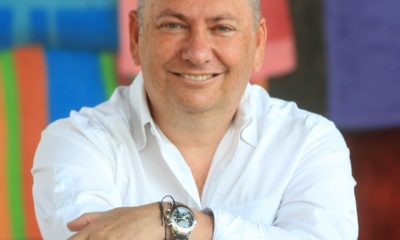

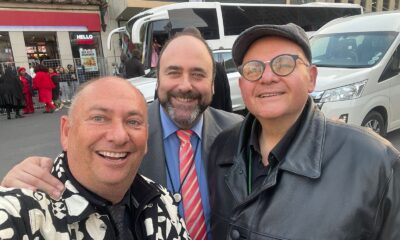

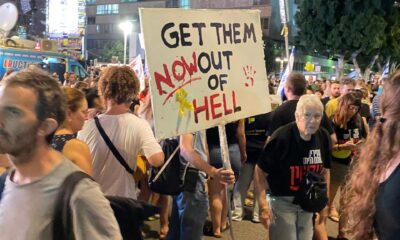

Isabel Forbes
January 18, 2024 at 5:55 pm
Dont ever forget who gave you the land Israel “The Lord God Almighty” He neither slumbers nor sleeps you are His people and He is your strong defence!
Our President has a short memory in their strugle for freedom it was the Jewish people in SA who supported them
Finacially legally accommodatoon. God is watching and they will fail!!